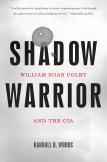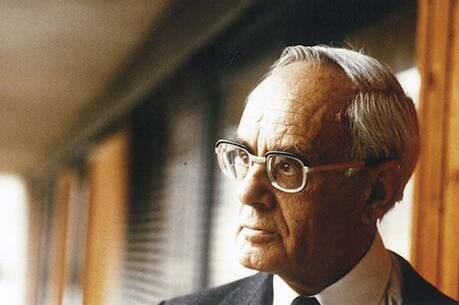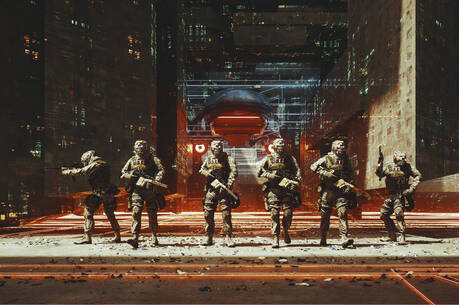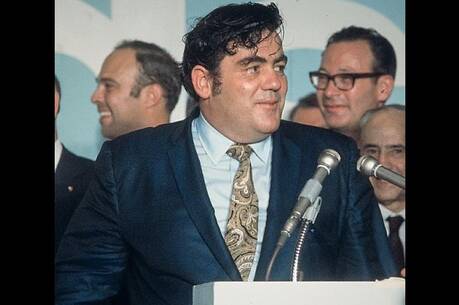Undercover Catholic
William Egan Colby was born in 1920. Both his parents were devoted Roman Catholics and supporters of President Franklin D. Roosevelt’s New Deal and internationalist foreign policy. He graduated from Princeton University in 1940 and after the Pearl Harbor attack, Bill left Columbia Law School and joined the Army.
In 1943, he became a protégé of Wild Bill Donovan’s O.S.S. and served as a special operator, trained to work with resistance forces, twice parachuting behind enemy lines in France in 1944 and a third time in Norway on a sabotage mission to destroy German railway lines.
In 1945, he married the socialite Barbara Heinzen, a practicing Catholic, and eventually fathered five children. In the next four years, Bill graduated from Columbia Law School, practiced law first in Wild Bill Donovan’s firm in New York, later in Washington D.C., as a liberal on the National Labor Relations Board. Then a friend offered him a job in the newly formed Central Intelligence Agency in 1949, where he would spend the next 27 years of his life.
As the Cold War hardened, Colby spent his first two years in Stockholm, Sweden, to help set up an anti-Communist paramilitary organization to counter any Soviet attempts to occupy the country. But it was in Italy where he spent the majority of the 1950s. As an undercover State Department official, a staunch Catholic and a liberal Democrat, Colby funneled money to the left-leaning anti-Communist Christian Democrats, preventing a takeover by the Communist Party. At the same time he waged a fierce struggle with Ambassador Claire Boothe Luce, who supported the more conservative right-wing parties.
In 1959, Colby became the C.I.A.’s deputy chief and then chief of station in Saigon, Vietnam, where he stayed until 1962. Charged with the task of supporting the Catholic Diem regime, the Colby family established a political and personal relationship with President Ngo Dinh Diem and his brother Nhu. Two reform programs—Agrovilles and Strategic Hamlets—were attempted. Both failed because the peasants were relocated, without any compensation, to inferior farm lands. Nor were they given arms to protect themselves, because the South Vietnamese government was afraid of encouraging an internal revolt. After three years of failed attempts at nation-building, Colby returned to Washington, D.C., to head the agency’s Far East division.
When he returned in 1968, Vietnam had become the focal point of American foreign policy. The Johnson administration had escalated the ground war with over 550,000 American troops engaged in most of the fighting. On Jan. 31, 1968, Vietcong troops attacked 40 major South Vietnamese cities, including Saigon. Though a military defeat for the enemy Vietcong, it was a major propaganda victory for them.
In response, Colby introduced a new strategy, the Phoenix Program, in an attempt to eliminate the Communist cadres that had infiltrated the villages and hamlets in South Vietnam. Colby believed that it was more effective than fighting a conventional war. More than 20,000 Vietcong (using Colby’s figures) were eliminated. While the anti-war left protested that this was an assassination program, Colby maintained that he was merely responding to the Vietcong, who had assassinated, according to one estimate, 40,000 South Vietnamese between 1957 and 1972. Clearly Colby had escalated nation-building from an economic reform program to one of military force.
When he returned to the United States in 1971, Colby found himself the target of anti-war groups. A wanted poster with skull and bones and a grotesque portrait of Colby was circulated across the country. After several reorganizations, President Nixon appointed him director of the C.I.A. in September 1973. It was a thankless task. The C.I.A. was being bombarded on all sides. Anti-war activists viewed Colby and the agency as assassins. President Nixon and Secretary of State Kissinger were angry and distrusted the agency for its failure to predict the outbreak of the Yom Kippur war between Egypt and Israel. They were also upset, as were many traditional C.I.A. agents on the right, when Colby revealed some of the “family jewels” to House and Senate special committees, which included details about recent economic operations against the left-leaning Chilean government that brought about a right-wing military dictatorship. Agency leaders also thought Colby went into too much detail about the Phoenix program.
Colby’s testimony before the congressional committees had a tone of remorse about the measures used to justify the killings. On one occasion, when Gerald Ford’s White House staff tried to dissuade Colby from giving classified information to Otis Pike’s House Intelligence Committee, Kissinger cracked: “Bill, you know what you do when you go up to the Hill? You go to confession.”
On the morning of Nov. 1, 1976, President Ford informed Colby that he was reorganizing his national security team. The D.C.I. was replaced by the less controversial George H. W. Bush. Colby was offered the post of ambassador to the North Atlantic Treaty Organization which he declined. After leaving the president’s office, he immediately called his wife, Barbara. It was a holy day of obligation. Instead of attending Mass at a Benedictine church where their sons had gone to school, they received Communion at the parish church near their home so as to avoid the press.
Colby’s post-C.I.A. life was almost as spectacular as his life as a spy. He wrote two books, Honorable Men, defending the agency from the excessive criticism of the congressional committees, and Lost Victory, which anticipated the revisionist views of the Vietnam War that say we could have won the war if the Nixon administration had supported the South Vietnamese government with full military force after the truce was broken in 1973. He resumed his legal practice and became involved in the campaign for a nuclear freeze, doing penance in the same way as President Lyndon B. Johnson’s former Secretary of Defense Robert McNamara. He also teamed up with the former chief of K.G.B. foreign counterintelligence in the development of the computer game “Spycraft.”
In 1984, he suddenly announced to his wife of 39 years that he wanted a divorce. Shocked, she responded, “We can’t. We are Catholic.” According to his most recent biographer, Randall Woods, the marriage was not a happy one, especially for Bill, who found his wife constantly engaged in meaningless conversation while their lives were full of constant social engagements, all of which annoyed the introspective and taciturn husband. Supposedly he realized the mistake he had made several weeks after their marriage. Until his divorce however, Colby was a staunch practicing Catholic. Two of his daughters made their first holy Communion at St. Peter’s Basilica in Rome, Italy, where Bill had been stationed as a C.I.A. agent chief. After his divorce, he renounced his Catholic faith when he married an attractive career government employee 27 years his younger.
Colby’s death was as mysterious as his life. On the night of April 27, 1996, he took his green canoe down the Severn River in southern Maryland. Eight days later his body was found downstream near the canoe. Did he commit suicide, as one son argued in a video about his life? Was he “whacked,” as his most recent biographer, Randall Woods, maintains? Or did he die from a heart-attack, as the Prince Georges’ County police officially wrote?
This article also appeared in print, under the headline “Undercover Catholic,” in the November 3, 2014, issue.








